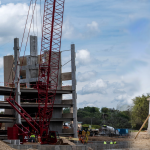Legal Expertise for Oklahoma Contractors
What Is a Product Defect?
 A product defect is an imperfection in a product that has. It can be a manufacturing defect or a design defect, which I've discussed in other videos, or is because of inadequate instructions or warnings. A good example of this would be instructions that are improperly translated from a foreign language or a product that poses a danger that's not accurately accounted for or identified in the instruction materials. In addition, an extreme example would be a gas appliance that may be physically defective or lack of warnings and instructions on proper ventilation that results in an injury. Read more »
A product defect is an imperfection in a product that has. It can be a manufacturing defect or a design defect, which I've discussed in other videos, or is because of inadequate instructions or warnings. A good example of this would be instructions that are improperly translated from a foreign language or a product that poses a danger that's not accurately accounted for or identified in the instruction materials. In addition, an extreme example would be a gas appliance that may be physically defective or lack of warnings and instructions on proper ventilation that results in an injury. Read more »What Is a Marketing Defect?
 A marketing defect is essentially the failure to adequately warn of a potential risk that is known or should have been known about a product or that is reasonably foreseeable or the failure to adequately instruct the end user as to the product safety. Read more »
A marketing defect is essentially the failure to adequately warn of a potential risk that is known or should have been known about a product or that is reasonably foreseeable or the failure to adequately instruct the end user as to the product safety. Read more »Delay v. Disruption
 A delay is simple as being late for whatever reason. And usually the remedy for a delay is additional time, depending on obviously the circumstances behind the delay. However, a disruption is a deviation from the planned method or contracted methods of work, which result in inefficiencies and ultimately greater expense to the project. Read more »
A delay is simple as being late for whatever reason. And usually the remedy for a delay is additional time, depending on obviously the circumstances behind the delay. However, a disruption is a deviation from the planned method or contracted methods of work, which result in inefficiencies and ultimately greater expense to the project. Read more »What Are Acceleration Damages?
 I'm going to discuss about what acceleration damages are. Oftentimes a contractor is rushed to complete a job ahead of schedule, or a portion of a job ahead of schedule compared to what was contracted for and as a result incurs additional expenses. And there may in a event like this be a claim for accelerated damages. And that is typically the additional expense incurred to meet the compressed time schedule. Obviously this is a case by case situation and it may not be reasonable to seek acceleration damages. Read more »
I'm going to discuss about what acceleration damages are. Oftentimes a contractor is rushed to complete a job ahead of schedule, or a portion of a job ahead of schedule compared to what was contracted for and as a result incurs additional expenses. And there may in a event like this be a claim for accelerated damages. And that is typically the additional expense incurred to meet the compressed time schedule. Obviously this is a case by case situation and it may not be reasonable to seek acceleration damages. Read more »How Weather Can Affect Different Types of Claims for Delays
 Typically a unforeseeable weather event is weather that's uncharacteristic for the time of year, since weather is for the most part considered a foreseeable event as there are lots of resources out there to establish weather patterns. For instance, the National Oceanic and Atmospheric Agency has very detailed information on weather conditions throughout the country, and the world for that matter. However, when there is a severe weather event, there may be opportunity for additional time or compensation, depending on the results of the event and how it's affected performance on a project. Otherwise, typically, bad weather doesn't justify additional time as it is foreseeable. Read more »
Typically a unforeseeable weather event is weather that's uncharacteristic for the time of year, since weather is for the most part considered a foreseeable event as there are lots of resources out there to establish weather patterns. For instance, the National Oceanic and Atmospheric Agency has very detailed information on weather conditions throughout the country, and the world for that matter. However, when there is a severe weather event, there may be opportunity for additional time or compensation, depending on the results of the event and how it's affected performance on a project. Otherwise, typically, bad weather doesn't justify additional time as it is foreseeable. Read more »The Truth Behind a Liquidated Damages Clause
 Liquidated damages are essentially a variation on actual damages and they're often used when actual damages would be hard to calculate. But from a contracting perspective, one wants to be mindful that they're not signing or agreeing to something that is inequitable. Otherwise, the risks are not being accurately allocated. This would be a one-sided situation where the risk far outweighs the reward. It's important to know what you're signing. Liquidated damages should also not be viewed as a punishment, but more as a compensation for loss, even though it can have the same feel as a punishment. Read more »
Liquidated damages are essentially a variation on actual damages and they're often used when actual damages would be hard to calculate. But from a contracting perspective, one wants to be mindful that they're not signing or agreeing to something that is inequitable. Otherwise, the risks are not being accurately allocated. This would be a one-sided situation where the risk far outweighs the reward. It's important to know what you're signing. Liquidated damages should also not be viewed as a punishment, but more as a compensation for loss, even though it can have the same feel as a punishment. Read more »What Is Time Is of the Essence Clause?
 In the event that there is a failure to meet deadlines a contractor can be exposed to damages for that delay. And if there's an accompanying liquidated damages clause that can outline additional damages beyond what may occur as just a result of the delay, that's why it's important when entering a contract with the time of the essence clause, there is a considerable thought put into how the project is going to progress and contingencies built into the schedule. So that in the event that there is a delay, a foreseeable delay that there's room there for error, and that one can continue and hopefully meet the schedule and avoid exposing themselves to damages as a result of the delay. Read more »
In the event that there is a failure to meet deadlines a contractor can be exposed to damages for that delay. And if there's an accompanying liquidated damages clause that can outline additional damages beyond what may occur as just a result of the delay, that's why it's important when entering a contract with the time of the essence clause, there is a considerable thought put into how the project is going to progress and contingencies built into the schedule. So that in the event that there is a delay, a foreseeable delay that there's room there for error, and that one can continue and hopefully meet the schedule and avoid exposing themselves to damages as a result of the delay. Read more »



